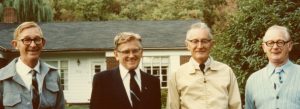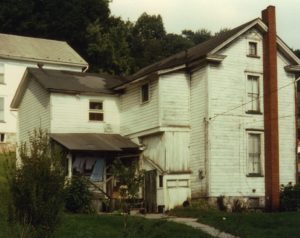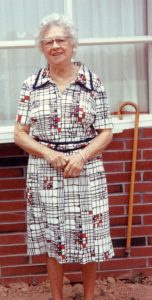
The four brothers, Dick, David, Harry, and Joe at their mother Ada’s funeral in Tyrone.
My father Harry was born in Tyrone, in the hills of central Pennsylvania. His family had been there for three generations. He was born in the house his grandfather David built on Lincoln Avenue, a white frame house that still stands there. David lived in that house first and raised his children there. When David’s son John grew up and married Ada and started a family, David built another house up the hill and moved into it, leaving the lower house for John and Ada and the four boys. My dad said that they traded because the lower house had a bigger garden, very important for raising food for four boys, to supplement John’s salary as a clerk for the Pennsylvania Railroad.
My dad was the third brother, after David and Joe and before Dick. They all had very different personalities. David was outgoing and affable, with a booming voice and a hail-fellow-well-met style; he made friends easily. Joe was sweet and funny. Harry, my dad, was a little reserved, likeable but not as outgoing as David. Dick, the youngest, always seemed shy, but sweet. I would say that David was the friendliest, Joe was the funniest, my dad was the smartest, and Dick was the quietest.
The picture shows the four of them, taken at their mother Ada’s funeral, the last time they were ever together. They had very different life experiences. Dick was the only one of the four who served in the Second World War, and was wounded while in the far east. My father wanted to enlist, to serve his country, but his poor hearing made him ineligible. Joe was deferred because of his work in an air depot in Connecticut, and David was deferred as a minister.
Dick and Doris had two children and the great sadness of their life was that Janet died as a young woman, the first of the cousins to die. Dick and Doris’ son Tommy never married and stayed in Hastings looking after his parents and working as a laborer. Some people would say he never amounted to much, but he was greatly mourned by his friends in the town when he died. Joe was sweet and funny and loved music and dancing. He and Helen had three sons. David would give you a big bear hug when you met him. He went to college, the first in the family to do so, and became a Methodist minister. He and his wife Veda moved around central Pennsylvania, as he was posted to different churches. I lived with them and their two children for a few years when my mother was ill, and after she died, but that’s a story for another post, as is Harry’s story.
The four brothers and their wives are all gone now, and no one from our family still lives in Tyrone. The cousins are scattered and we don’t keep in touch. It’s a shame, but it started when the brothers left Tyrone. There was nothing to keep them there.



